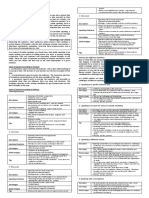Verbs - Transitive and Intransitive
Verbs - Transitive and Intransitive
Uploaded by
Myrrh Tagurigan TrainCopyright:
Available Formats
Verbs - Transitive and Intransitive
Verbs - Transitive and Intransitive
Uploaded by
Myrrh Tagurigan TrainOriginal Title
Copyright
Available Formats
Share this document
Did you find this document useful?
Is this content inappropriate?
Copyright:
Available Formats
Verbs - Transitive and Intransitive
Verbs - Transitive and Intransitive
Uploaded by
Myrrh Tagurigan TrainCopyright:
Available Formats
1. Know your material. Pick a topic you’re interested in.
Know more about it than you include in your speech.
Use humor, personal stories, and conversational language—that way, you won’t easily forget what to say.
2. Practice, practice, practice! Rehearse out loud with all the equipment you plan on using. Revise as necessary.
Work to control filler words; practice, pause, and breathe. Practice with a timer and allow time for the
unexpected.
3. Know the audience. Greet some of the audience members as they arrive. It’s easier to speak to a group of
friends than it is to speak to strangers.
4. Know the room. Arrive early, walk around the speaking area, and practice using the microphone and any
visual aids.
5. Relax. Begin by addressing the audience. It buys you time and calms your nerves. Pause, smile, and count to
three before saying anything. (One one thousand, two one thousand, three one thousand. Pause. Begin.)
Transform nervous energy into enthusiasm.
6. Visualize yourself giving your speech. Imagine yourself speaking, your voice loud, clear, and confident.
Visualize the audience clapping—it will boost your confidence.
7. Realize that people want you to succeed. Audiences want you to be interesting, stimulating, informative, and
entertaining. They’re rooting for you.
8. Don’t apologize for any nervousness or problem—the audience probably never noticed it.
9. Concentrate on the message, not the medium. Focus your attention away from your own anxieties and
concentrate on your message and your audience.
* Get a massage. Getting a massage (especially with lavender essential oil)can help improve your focus and
reduce anxiety.
* Practice savasana (corpse pose). Lie flat on your back, extend your arms away from your body with your
palms facing upward, and separate and extend your legs. Breathe. Stay in this position for at least five to ten
minutes.
* Meditate. Sit in a quiet place and focus only on your breath. Practicing meditation will reduce anxiety and
give you the ability to think more clearly and articulate your thoughts better
Organize your speech. Jot down the 3 or 4 main points you want your audience to remember. Summarize
each idea in a single clear sentence. Then group pertinent information, around each idea. Facts may be
important to your topic, but stories involving real people will usually have a greater impact on your audience.
Rehearse your speech. Time the delivery to match the minutes allotted.
Write your speech. Use words and sentences that are short and clear. Don't clutter it with professional or
technical jargon.
Crack a joke, if appropriate. This will lighten the mood and pull the audience in. Don't make too many,
though, because they might think that you are unprofessional.
Write down your main points on 3x5 note cards.
Look up! While taking a breath, while stuttering by accident, just look up at the audience and let them
recognize that you know they're there.
Deliver your speech to your audience. Speak slowly and loudly. Stand in a relaxed manner with your feet
slightly apart. Your hands should be at your side.
Verbs - Transitive and
Intransitive
Verbs can be classified as transitive or intransitive.
A transitive verb always has a direct object – a noun or pronoun that receives the action of the
verb. The object shows who or what completes the action expressed in the verb.
e.g., James hit the ball.
Hit is a transitive verb. The direct object is
ball.
Ball tells you what James hit.
Roger eats a big breakfast every morning.
Eats is a transitive verb.
The direct object of eats is breakfast. Breakfast tells
you what Roger eats.
An intransitive verb does not have an object. It does not need an object to complete the
action expressed in the verb.
e.g., The little girl sat quietly in the chair.
Margaret walked slowly down the street.
Sat and walked are intransitive verbs. They do not have a direct object
to complete or receive the action.
Some verbs can be either transitive or intransitive, depending on how they are used in the
sentence.
e.g., We read the news with great care.
In this example read is transitive and has the direct object news.
e.g., We read until late at night.
In this example read is intransitive. There is no object to receive
or complete the action.
In the following exercises underline the verbs and tell whether they are transitive or
intransitive. Circle the direct objects.
e.g., The customers formed long lines outside the shop. transitive
("lines" would be circled)
The happy villagers danced in the streets. intransitive
1. Mr. Jenkin’s cat watched the birds in the trees.
2. We will not buy a new car until next summer.
3. The small boat moved slowly through the grey sea.
4. Diane tripped on the top step and fell downstairs.
5. Please order a hamburger and a milkshake for me.
6. Have you ever explored a cave?
7. Many years ago, a young boy discovered a huge cave in Kentucky.
8. The cave contained strange, twisted formations of stone and crystal.
9. Your friend Tom has a very intriguing job.
10. We arrived at the stadium ten minutes before the game started.
11. Do you play tennis every day?
12. After the election, the Prime Minister assembled his cabinet.
13. At our last meeting we discussed the problem of leaking pipes.
14. Mr. Clark spoke for more than an hour about the deficit in our finances.
15. The old cabin was surrounded by many tall trees.
1. The house on the hill belongs to the Millers.
2. Mrs. Russell has three children in elementary school.
3. You should not walk in the rain without your boots.
4. The failure of the experiment discouraged Charles.
5. The man showed us a picture of his entire family.
6. He has perfected several new techniques for medical
7. research.
Why did you take my umbrella?
8. Beethoven composed many great pieces of music.
9. How many famous paintings does he possess?
10. Tom likes neither coffee nor tea.
11. My uncle has lived in Paris for many years.
12. Many of the buildings in Paris are very old and beautiful.
13. Did you speak to the counselor about your problem?
14. John’s plans for the new house were incomplete.
15. Mr. Gibbs stopped at the filling station for some gas.
1. I must buy new skis and boots this year.
2. I have seen many different styles of boots and skis in the
shops.
5. Quickly and skillfully he cut the dead branches from the tree.
3. The train to Vancouver was delayed by bad weather.
5. Quickly and skillfully he cut the dead branches from the tree.
6. The flagship of Napolean’s fleet was called the Inconstant.
4.6. Many strange of
The flagship creatures live in
Napolean’s thewas
fleet oceans of the Inconstant.
called world.
7. The ship held the Emperor, his staff, and forty grenadiers.
7. The ship held the Emperor, his staff, and forty grenadiers.
8. How many apples did you use for the pie?
8. How many apples did you use for the pie?
1.9. I must buy new
Our camp skistold
leader andusboots
ghostthis year.around the fire.
stories
9. Our camp leader told us ghost stories around the fire.
2. I have
10. seen
I should many
have different
gone to the styles
concertofwith
boots and
you skis in the
yesterday.
shops.
11.
11. Did
Did you
you take
take Helen
Helen to
to the
the concert
concert instead?
instead?
3. The train to Vancouver was delayed by bad weather.
12. Inside the museum there is a great display of unusual rock
12. Inside the museum there is a great display of unusual rock
formations.
4. Many strange creatures live in the oceans of the world.
formations.
13. Filters improve the clarity of a photograph by reducing the
13. Filters improve the clarity of a photograph by reducing the
amount of light.
amount of light.
14. Every inch of ground beneath the huge pines is covered with a
wet quilt of golden needles.
Answer Key (words you were asked to circle are shown in italics)
Exercise A Exercise B
1. watched, birds, transitive 1. belongs, intransitive
2. will buy, car, transitive 2. has, children, transitive
3. moved, intransitive 3. should walk, intransitive
4. tripped, fell, intransitive 4. discouraged, Charles, transitive
5. order, hamburger, milkshake, 5. showed, picture, transitive
transitive 6. has perfected, techniques,
6. have explored, cave, transitive transitive
7. discovered, cave, transitive 7. did take, umbrella, transitive
8. contained, formations, transitive 8. composed, pieces, transitive
9. has, job, transitive 9. does possess, paintings, transitive
10. arrived, started, intransitive 10. likes, coffee, tea, transitive
11. do play, tennis, transitive 11. has lived, intransitive
12. assembled, cabinet, transitive 12. are, intransitive
13. discussed, problem, transitive 13. did speak, intransitive
14. spoke, intransitive 14. were, intransitive
15. was surrounded, intransitive 15. stopped, intransitive
Exercise C
1. must buy, skis, boots, transitive
2. have seen, styles, transitive
3. was delayed, intransitive
4. live, intransitive
5. cut, branches, transitive
6. was called, intransitive
7. held, Emperor, staff, grenadiers,
transitive
8. did use, apples, transitive
9. told, stories, transitive
10. should have gone, intransitive
11. did take, Helen, transitive
12. is, intransitive
13. improve, clarity, transitive
14. is covered, intransitive
You might also like
- IELTS SPEAKING Lesson 26 ParaphrasingDocument18 pagesIELTS SPEAKING Lesson 26 Paraphrasingbách nguyễnNo ratings yet
- Week 3 Expressing Thoughts and FeelingsDocument20 pagesWeek 3 Expressing Thoughts and FeelingsPhoebe TanNo ratings yet
- Dramatic Literary Devices: Act Scene Aside SoliloquyDocument3 pagesDramatic Literary Devices: Act Scene Aside SoliloquyDeepak KumarNo ratings yet
- Noam Chomsky) New York Westport. Connecticut London.: LanguageDocument18 pagesNoam Chomsky) New York Westport. Connecticut London.: LanguageHassan OucheikhNo ratings yet
- Using Context CluesDocument79 pagesUsing Context CluesNelladionela100% (1)
- Parts of Speech TestDocument2 pagesParts of Speech Testapi-249283966No ratings yet
- ENGLISH PPT Part of SpeechDocument12 pagesENGLISH PPT Part of SpeechEko HaryantoNo ratings yet
- Inquiry Lesson (1) : Subject & Grade: Year 2 Inquiry/HASS Topic: Places of Significance ACDocument8 pagesInquiry Lesson (1) : Subject & Grade: Year 2 Inquiry/HASS Topic: Places of Significance ACapi-533606711No ratings yet
- Possessive PronounsDocument9 pagesPossessive PronounslskjunNo ratings yet
- Active Passive VoiceDocument26 pagesActive Passive VoiceAman BeriwalNo ratings yet
- Philosopher Thales, Socrates, Plato, AristotleDocument22 pagesPhilosopher Thales, Socrates, Plato, AristotleYam MuhiNo ratings yet
- Reading Strategies PartDocument50 pagesReading Strategies Partdalia100% (1)
- Pronoun: DefinitionDocument8 pagesPronoun: DefinitionRegiena AnicieteNo ratings yet
- The Lottery ScriptDocument5 pagesThe Lottery ScriptCaeth JuanitesNo ratings yet
- What Is A VerbDocument3 pagesWhat Is A VerbahmedaliNo ratings yet
- American Slang With Dialogues HDocument5 pagesAmerican Slang With Dialogues HYnt NwNo ratings yet
- Teaching-How To Be An Effective TeacherDocument10 pagesTeaching-How To Be An Effective TeacherVildana NeslanovićNo ratings yet
- Eng 8 q1 w5 6 ModuleDocument6 pagesEng 8 q1 w5 6 ModuleKenneth Lei D. HadjilatipNo ratings yet
- 4 Use Words That Function As Adjectives and AdverbsDocument19 pages4 Use Words That Function As Adjectives and AdverbsJennie MaderazoNo ratings yet
- 7-Phrase & ClauseDocument26 pages7-Phrase & ClauseMalik DaniyalNo ratings yet
- 2.1 - Noun - and - PronounDocument27 pages2.1 - Noun - and - PronounSadiq MazariNo ratings yet
- Scientific MethodDocument9 pagesScientific Methoduzma sagheer janjuaNo ratings yet
- Effective Listening Skills: by Muhammad RizwanDocument20 pagesEffective Listening Skills: by Muhammad RizwanAppadurai MuthukrishnanNo ratings yet
- Types of PronounsDocument22 pagesTypes of PronounsImanNurAnaqiIshakNo ratings yet
- Subject PredicateDocument69 pagesSubject PredicateyuldaNo ratings yet
- Word AssociationsDocument2 pagesWord AssociationsJennifer Garcia EreseNo ratings yet
- Descriptive TextDocument7 pagesDescriptive TextArif ArdiyanNo ratings yet
- Transitive and Intransitive VerbsDocument12 pagesTransitive and Intransitive Verbsarmand rodriguezNo ratings yet
- MODULE in EUTHENICS UNIT 1 Topic 2Document6 pagesMODULE in EUTHENICS UNIT 1 Topic 2Princess Sarah Mae AmistadNo ratings yet
- EXample TEFL Lesson PlansDocument6 pagesEXample TEFL Lesson PlansEka Preissinta putriNo ratings yet
- Developmental ReadingDocument5 pagesDevelopmental ReadingIsabel Guape100% (2)
- Introduction To Public SpeakingDocument5 pagesIntroduction To Public SpeakingHailey ConstantinoNo ratings yet
- English StrategiesDocument124 pagesEnglish StrategiesRobert NeroNo ratings yet
- KapreDocument4 pagesKapreLeah CañezalNo ratings yet
- Infinitive PhrasesDocument1 pageInfinitive PhrasesChrisBaruelNo ratings yet
- Eye ContactDocument8 pagesEye Contactjenny anaudNo ratings yet
- Developing The Four Essential SkillsDocument2 pagesDeveloping The Four Essential SkillsdavidNo ratings yet
- What Is Coherence in WritingDocument3 pagesWhat Is Coherence in WritingJawad Haider100% (1)
- Developing The Topic Sentence in A ParagraphDocument20 pagesDeveloping The Topic Sentence in A ParagraphJenny PadlanNo ratings yet
- World Lit ReportDocument3 pagesWorld Lit ReportPero Cortez100% (2)
- Active & Passive VoiceDocument14 pagesActive & Passive VoiceVanshikaNo ratings yet
- Greek MythsDocument3 pagesGreek MythsCarl RNo ratings yet
- Developing Children's Listening and Speaking in ESLDocument16 pagesDeveloping Children's Listening and Speaking in ESLKamolpan Jammapat100% (9)
- TG Oral ComDocument42 pagesTG Oral ComRhayan De CastroNo ratings yet
- Hearing Vs ListeningDocument14 pagesHearing Vs ListeningKizeia Belfon100% (1)
- Superiority Inferiority ComplexDocument9 pagesSuperiority Inferiority ComplexAyesha AkbarNo ratings yet
- Greek GodsDocument11 pagesGreek GodsQueenie Anne Barroga AspirasNo ratings yet
- Morphology: Word Formation ProcessesDocument6 pagesMorphology: Word Formation ProcessesMay Mustafa F Ra'fatNo ratings yet
- How Does Cultural Shape Moral BehaviorDocument2 pagesHow Does Cultural Shape Moral BehaviorRomielyn MenguezNo ratings yet
- EuphemismsDocument20 pagesEuphemismsWayne100% (1)
- Subject Verb AgreementDocument17 pagesSubject Verb AgreementMaia Joyce SagerNo ratings yet
- Gerund A Verbal TranformationDocument20 pagesGerund A Verbal TranformationMaybel CastorNo ratings yet
- Child Rights and Duties: Prepared By: Ashree Paudel Class: 3'H'Document6 pagesChild Rights and Duties: Prepared By: Ashree Paudel Class: 3'H'SushrutNo ratings yet
- Reviewing Subject - Verb AgreementDocument26 pagesReviewing Subject - Verb AgreementBennilyn Yvette B. OpedaNo ratings yet
- Text Types According To PurposeDocument1 pageText Types According To PurposeJeffrey Estacio100% (1)
- Simple Sentence: From Wikipedia, The Free EncyclopediaDocument4 pagesSimple Sentence: From Wikipedia, The Free Encyclopediafauzihidayatullah100% (1)
- Word OrderDocument6 pagesWord OrderEditura Sf MinaNo ratings yet
- Transitive Intransitive Verbs Explanation and ExercisesDocument5 pagesTransitive Intransitive Verbs Explanation and ExercisesJuliana Chancafe IncioNo ratings yet
- Grammar Verb TransDocument5 pagesGrammar Verb Transrahaf ahmedNo ratings yet
- Grammar Verb TransDocument5 pagesGrammar Verb Transrahaf ahmedNo ratings yet
- Nouns ExerciseDocument21 pagesNouns ExerciseVora AyushNo ratings yet
- Case Study DelegationDocument7 pagesCase Study DelegationMyrrh Tagurigan TrainNo ratings yet
- Abortion Suicide FactsDocument3 pagesAbortion Suicide FactsMyrrh Tagurigan TrainNo ratings yet
- Color Your InterestsDocument2 pagesColor Your InterestsMyrrh Tagurigan Train100% (1)
- In Passive Voice SentencesDocument14 pagesIn Passive Voice SentencesMyrrh Tagurigan Train100% (1)
- Protein BiosynthesisDocument21 pagesProtein BiosynthesisMyrrh Tagurigan TrainNo ratings yet
- Natureandconceptofmanagement WordDocument22 pagesNatureandconceptofmanagement WordMyrrh Tagurigan TrainNo ratings yet
- EsP8-Teacher's GuideDocument25 pagesEsP8-Teacher's GuideMyrrh Tagurigan Train0% (1)
- Action Plan: Eva A. Magallanes Doña Carmen Denia National High School Edukasyon Sa PagpapahalagaDocument8 pagesAction Plan: Eva A. Magallanes Doña Carmen Denia National High School Edukasyon Sa PagpapahalagaMyrrh Tagurigan TrainNo ratings yet
- Career Analysis Profile Sheet ADocument5 pagesCareer Analysis Profile Sheet AMyrrh Tagurigan Train100% (11)
- Game ShowDocument42 pagesGame ShowMyrrh Tagurigan TrainNo ratings yet
- Powerpoint Lesson 1 of - SifeDocument6 pagesPowerpoint Lesson 1 of - SifeMyrrh Tagurigan TrainNo ratings yet
- Principles of Speech Writing Principles of Speech WritingDocument4 pagesPrinciples of Speech Writing Principles of Speech WritingMyrrh Tagurigan Train100% (3)
- Oral CommunicationDocument5 pagesOral CommunicationMyrrh Tagurigan TrainNo ratings yet
- DLP-Composing An Effective ParagraphDocument10 pagesDLP-Composing An Effective ParagraphsalditoskriiusyNo ratings yet
- SMP Negeri 40 Kota Bekasi: Narrative TextDocument9 pagesSMP Negeri 40 Kota Bekasi: Narrative TextFirda ZaniNo ratings yet
- Tide Tool 7.0 Manual V1.1Document38 pagesTide Tool 7.0 Manual V1.1Lito RomerozNo ratings yet
- Hassan Ghiassi Training Resume 2015Document1 pageHassan Ghiassi Training Resume 2015api-310351484No ratings yet
- E-Portfolio and Presentation RubricDocument2 pagesE-Portfolio and Presentation Rubriccookd150% (2)
- History of Applied LinguisticsDocument4 pagesHistory of Applied LinguisticsSajdah Imtiaz100% (7)
- Tammy Phillips ResumeDocument2 pagesTammy Phillips ResumetammyNo ratings yet
- Barriers of CommunicationDocument7 pagesBarriers of CommunicationambrienNo ratings yet
- Proto Turkic Urheimat - HTMLDocument126 pagesProto Turkic Urheimat - HTMLAyazidNo ratings yet
- Chapter 5 Instructional Materials For Language TeachingDocument35 pagesChapter 5 Instructional Materials For Language TeachingChAvsdelRosarioNo ratings yet
- Engl 157 (Communication Skills Combined) Bý Abc - 230201 - 104645Document291 pagesEngl 157 (Communication Skills Combined) Bý Abc - 230201 - 104645kevin iyese100% (1)
- Common Syllabus For Bba/Bca/ Btech English & Communication SkillsDocument2 pagesCommon Syllabus For Bba/Bca/ Btech English & Communication Skillsmansoor ahmadNo ratings yet
- IDocument18 pagesIShinta Ari HerdianaNo ratings yet
- Assessing LanguageDocument14 pagesAssessing LanguageAmi AsnainiNo ratings yet
- Brown University Et Al. Amicus BriefDocument20 pagesBrown University Et Al. Amicus BriefSeth OrkandNo ratings yet
- PAST (прошедшее) TENSE: Past Simple Past Continuous Past Perfect Past Perfect ContinuousDocument1 pagePAST (прошедшее) TENSE: Past Simple Past Continuous Past Perfect Past Perfect ContinuousRiNo ratings yet
- Vocab StrategiesDocument6 pagesVocab StrategieseeepeNo ratings yet
- De Thi Hoc Ki 1 Mon Tieng Anh Lop 5 Co File NgheDocument10 pagesDe Thi Hoc Ki 1 Mon Tieng Anh Lop 5 Co File Nghetuyen truongNo ratings yet
- Answer Sheet EspDocument2 pagesAnswer Sheet EspPhi PhanNo ratings yet
- PHD PDFDocument53 pagesPHD PDFPriyashunmugavelNo ratings yet
- SJK (C) Pei Hwa Year 6 English Language Assessment (1) : Comprehension Paper 1 Hour 15 MinutesDocument15 pagesSJK (C) Pei Hwa Year 6 English Language Assessment (1) : Comprehension Paper 1 Hour 15 Minutesvictorteh87No ratings yet
- Tiếng Anh (Đề 901), thi thử lần 2Document3 pagesTiếng Anh (Đề 901), thi thử lần 2Xuân Phương NguyễnNo ratings yet
- ENGL 103 - Argumentative Research Paper CriteriaDocument2 pagesENGL 103 - Argumentative Research Paper Criteriakotisekhan10No ratings yet
- Passive Voice 1 Present Simple, Past SimpleDocument3 pagesPassive Voice 1 Present Simple, Past SimplemariusborzaNo ratings yet
- SJT PPPK GuruDocument63 pagesSJT PPPK Gurumbenazirsyauqi94No ratings yet
- Simple Future TenseDocument6 pagesSimple Future TenseDaniel DíazNo ratings yet
- Tugas Pertama Bahasa Inggris 1Document8 pagesTugas Pertama Bahasa Inggris 1Fazril ButonNo ratings yet
- Either Neither or NorDocument4 pagesEither Neither or NorGeri O'DonnellNo ratings yet
- Rubric For The Background of The StudyDocument1 pageRubric For The Background of The Studydanzkietanaleon10No ratings yet






































































































